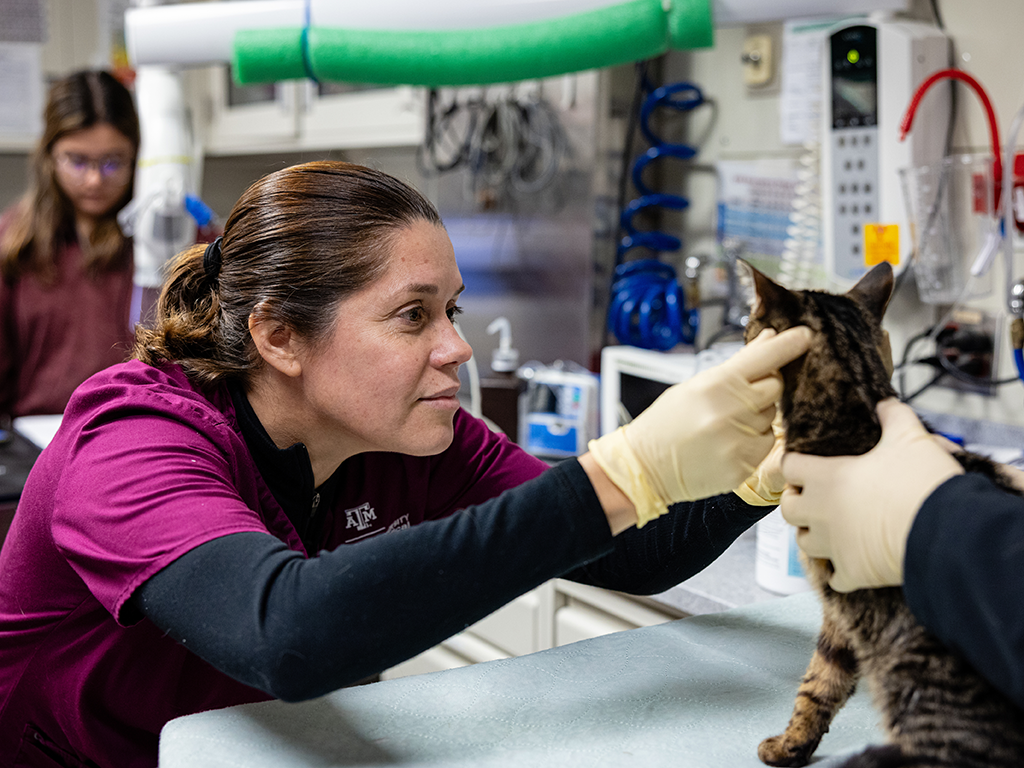Seeking Fur-ther Expertise: When To See A Board-Certified Veterinary Specialist
Board certification generally means that an individual has had additional training and education in their area of expertise.

Veterinary specialists allow you to get care and answers that a general practitioner cannot provide.
Veterinarians play an essential role in keeping pets healthy, often working as a team to ensure each animal receives the care it needs. In some cases, a board-certified specialist with advanced training in a specific body system or field of medicine may be sought to collaborate with primary care veterinarians, offering additional insight that helps expand diagnostic and treatment options.
Dr. Stacy Eckman, associate dean for hospital operations and chief executive officer for the Texas A&M College of Veterinary Medicine and Biomedical Sciences’ Veterinary Medical Teaching Hospital, explains what board certification involves and how these specialists work alongside general practitioners to provide advanced, highly coordinated care tailored to each patient’s needs.
Understanding Board Certification
All practicing veterinarians must earn a Doctor of Veterinary Medicine (DVM) degree and pass a national licensing exam to treat patients, after which they can choose to enter the workforce or continue their training to pursue board certification.
“Board certification generally means that an individual has had additional training and education in their area of expertise,” Eckman said. “You can choose to be board certified in a variety of different specialties, such as cardiology, neurology, or pathology.”
Veterinarians who want to specialize typically complete a one-year rotating internship to explore a wide variety of specialties, followed by a three or four-year residency in their chosen field. Some may also complete a one-year specialty internship before their residency to further prepare them for a residency program.
“Another path to board certification is through the American Board of Veterinary Practitioners, commonly referred to as practitioner boards,” Eckman said. “After spending a minimum of four years in general practice, veterinarians can pursue this certification by completing additional testing and submitting written work. This can also be achieved by completing a residency program under an ABVP specialist. Practitioner board certification is species-specific, with specialties such as equine, food animals, canine, feline, and exotics.”
When To Seek A Board-Certified Specialist
A primary care veterinarian can handle many common pet health concerns, but a board-certified specialist can provide an extra layer of expertise for complicated conditions and treatments.
“There are some things that a general practitioner may not be able to do, but a cardiologist or neurologist can,” Eckman said. “Like in human medicine where you have a doctor who specializes in treating specific health conditions — such as hormone-related conditions, eye surgeries, or brain disorders — veterinary specialists allow you to get care and answers that a general practitioner cannot provide.”
Determining when it is time to seek care from a board-certified specialist can be overwhelming for many pet owners, but having a conversation with your primary care veterinarian is a great place to start.
Most of the time, your primary care veterinarian will recognize that the case is outside their comfort level and it’s in the pet’s best interest to see a specialist.
“Board-certified veterinarians collaborate very closely with the primary care veterinarian, who saw the animal first and, therefore, has a deeper understanding of the pet’s history and diagnostics and treatments already performed and response to that treatment,” Eckman said. “Specialists consult with them throughout the process, and when the pet is stable, they often return care back to the primary veterinarian.”
Considering The Costs
While board-certified specialists are often necessary for treating complex issues, seeking care from a specialist can come with higher costs due to their specialized expertise.
“Typically, you are not just working with one specialist; you work with a team of multiple specialists — such as a cardiologist, an internist, and an anesthesiologist — to get their expert opinions,” Eckman said. “Additionally, there is specialty equipment involved for advanced imaging such as MRIs, surgeries, and other procedures, which contributes to cost differences.”
Budget constraints can make decisions difficult for owners, but veterinarians are typically upfront about pricing and alternatives.
“If the top-tier recommended treatment is not affordable, having a conversation with your veterinarian about middle-ground options can help,” Eckman said. “It’s all part of the team working to get the best care for the patient within the client’s budget.” As veterinary medicine continues to advance, access to specialized expertise is becoming easier, ensuring pets receive the highest level of treatment tailored to their needs. Staying informed about your pet’s health and having open discussions with your primary care veterinarian can help you determine when seeing a specialist is the right choice.
